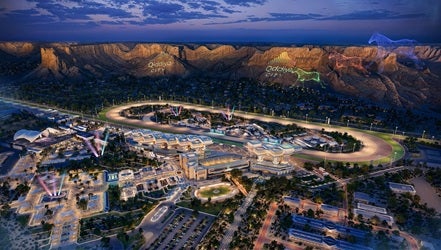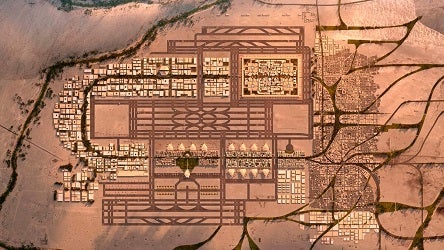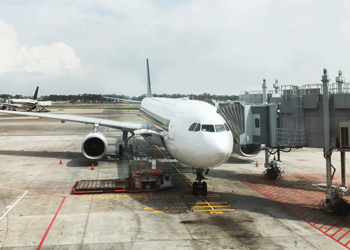ACC leverages expertise to tap new markets
23 November 2022

The UK government announced in October that it will provide funding support for the construction of 10 modern office buildings for a ministerial city in Benin’s largest city Cotonou.
The firm leading the construction is Arabian Construction Company (ACC), and the West African project is the latest example of how the Abu Dhabi-headquartered contractor has used the experience it has developed in the UAE and the Middle East to become an international construction company operating across multiple countries and continents.
ACC was founded in Lebanon in 1967 and early in its history set up a base in Abu Dhabi. From there, it grew to become one of the Middle East’s leading construction companies, offering a range of services to its clients.
“We cover almost every aspect of the construction sector, although we are better known, and receive more attention, for high-rise and the more complex type of buildings,” says Maher Merehbi, ACC’s CEO.
“Among the more recent examples of our flagship projects are Sky View and Address Fountain Views in Downtown Dubai, and the Central Market towers, and Etihad Towers in Abu Dhabi.”
As the UAE has developed over the past 50 years, ACC has had the opportunity to work on a wide range of projects. “The UAE has offered a tremendous diversity of work,” says Merehbi.
“A strong recognition should be given to the standard and quality of projects the country has delivered over the past 20 or 30 years. As the UAE has been continuously evolving, this has contributed substantially to the expertise that we have acquired as we grew and evolved with it. Very few cities or countries can claim to have the same quality projects.”

ACC is leading the construction of office buildings for a project in Benin
Building expertise
Developing project and construction management expertise have been key factors in ACC’s success.
“When you run such complex projects, project management and construction management are the essential tools for successful delivery,” says Merhebi.
“As projects grew in complexity and in size, we developed enhanced and more advanced construction management and project management techniques that allow us to maintain both quality and control.
“Control not only focuses on delivering on time, but delivering a high standard that maintains the projects’ performance to the expectations of the employer.”
In addition to traditional contracting, design-and-build contracts have been used as an alternative method of project delivery.
“This is an avenue we have tackled, and we have executed several projects on that model,” says Merhebi.
“Design-and-build is one of the better ways of delivering projects if you wish to do away with the traditional problems of design and specifications modifications or incomplete or misadapted designs. While it relieves the employer from certain risks, it allows the contractor a certain degree of flexibility on the construction methodologies, but it also allocates more responsibility to the contractor.”
ACC has also taken the design-and-build model a step further by becoming a co-developer in some projects.
“Seasoned developers appreciate that early involvement of the contractor, and the design-build approach, protect the employer from certain risks. This has opened up interesting opportunities where we will take a stake in the equity, and that allows the interests of the contractor and developer to be truly aligned,” says Merehbi.
“Partnering is a little bit unbalanced when all the parties involved do not have an aligned objective. For example, the employer stands to gain from reducing payments to the contractor while the contractor gains from an increase in project payments.
“Clearly such a situation establishes limitations on the partnering concept. For better alignment of interests between the employer and contractor, the contractor’s role extends beyond merely providing construction services. The contractor is more involved and has a larger contribution to the project.”
Tapping new markets
Outside Lebanon and the UAE, ACC expanded across the region in the 1970s and has worked in most Middle Eastern markets.
“With high oil prices, the economies were growing fast and there was a lot of demand in the market. For ACC, the economic boom in the region meant expansion was the natural avenue,” says Maher.
Moving into new markets showed that even neighbouring countries with similar economic drivers can be quite different when it comes to contracting.
“Every market is unique in its own way. You have to recognise that there are market variances in the way business is carried out, distinctive cultures and customs, and the way the supply chain works is also different. A contractor has to recognise these differences very quickly and adapt. Often contractors enter a market without the willingness or the ability to conform and integrate,” says Merehbi.
ACC has expanded from the Middle East, establishing a strong base in Egypt, and also into South Asia with work in Pakistan in the 1990s, and then in India in the 2010s. The firm also took steps to enter the European market with work in Cyprus and is now pursuing projects in Greece. ACC is also active in Africa with projects such as the ministerial complex in Benin.
Rather than entering new markets as a management contractor that relies on managing local contractors, for ACC, entering new markets is a major commitment that requires investment in local operations.
“Contracting carries a lot of risks. Relying on third parties to execute the majority of construction activity creates high uncertainties. We pay particular attention to the reputational impact of our projects and prefer to execute our own works,” says Merehbi.
“While there are undoubtedly reputable companies in various disciplines, executing through the project management methodology still leaves some exposure. So instead of managing someone else’s execution strategy, we would rather make our own and manage our own team.”
Self-performing is important in markets where supply chains do not cover the entire spectrum of services, such as in some African countries.
“ACC has fully deployed in Africa. We operate there as we do in any of our other markets. We go through the full process and cycle of hiring, training and monitoring. That is what being a contractor is about,” says Merehbi.
Financing is also a key element of winning work in Africa, although Merehbi says this is no different from other markets.
“Financing is a key element in every market,” he says. “In certain areas with a growing economy, funding is more easily available. In other areas, the contractor may be required to contribute to the funding.”
Instead of managing someone else’s execution strategy, we would rather make our own and manage our own team
Raising finance
Funding projects has become more challenging with rising interest rates, but Merehbi expects a mixed impact depending on the nature of the project.
“There are short- or medium-term projects that require early pay back and profit generation and then there are projects that are inherent to a country’s infrastructure and capture economic benefits over a longer period. Higher interest rates affect categories of projects differently,” he says.
“For example, if you are building a hospital that is state-run, then the government’s primary objective is to supply the medical services, and if it can afford it, then it will go ahead and do it. Commercial profit would not be the primary objective in this case. A private developer will probably take a different approach; if the funding becomes too expensive it may choose to postpone the project.”
As market dynamics change, selecting the right projects will remain critical. This is particularly important for ACC as the business, unlike many of its competitors, is still privately held.
“We are a family business. We are managing family assets. If the project makes commercial sense, we will go for it. We will take the risks that contractors are expected to take; it is part of the job, but we are not driven by accumulation of backlog for end-of-year reporting,” says Merehbi.
Exclusive from Meed
-
 AI signals a new efficiency era for oil and gas
AI signals a new efficiency era for oil and gas11 February 2026
-
 February deadline for Qiddiya racecourse bids
February deadline for Qiddiya racecourse bids11 February 2026
-
 King Salman airport signs mixed-use project agreements
King Salman airport signs mixed-use project agreements11 February 2026
-
 Saudi Arabia signs $5.3bn Syria reconstruction deal
Saudi Arabia signs $5.3bn Syria reconstruction deal11 February 2026
-
 Indian firm wins contract for UAE battery project
Indian firm wins contract for UAE battery project11 February 2026
All of this is only 1% of what MEED.com has to offer
Subscribe now and unlock all the 153,671 articles on MEED.com
- All the latest news, data, and market intelligence across MENA at your fingerprints
- First-hand updates and inside information on projects, clients and competitors that matter to you
- 20 years' archive of information, data, and news for you to access at your convenience
- Strategize to succeed and minimise risks with timely analysis of current and future market trends

Related Articles
-
 AI signals a new efficiency era for oil and gas
AI signals a new efficiency era for oil and gas11 February 2026
Artificial intelligence (AI) is poised to deliver one of the biggest leaps in operational efficiency the oil and gas industry has seen in decades – but not in the ways most expect. In a sector where progress is typically measured in micro-optimisations, harsh terrain, sprawling pipelines and escalating security risks make even small improvements valuable. Now, machine learning, edge computing, the industrial internet of things (IIoT), cloud and big data are converging into something far more disruptive.
 A major global oil and gas player recently tested an intriguing Proof of Concept with Nokia, leveraging existing fiber buried along pipelines for real-time “fiber sensing.” What they uncovered could reshape how infrastructure threats are detected. Optical fiber, it turns out, is sensitive enough to register disturbances caused by everything from rainfall to trucks, earthquakes and human intrusion. When paired with long-range anomaly detection, the implications for pipeline safety stretch far beyond routine monitoring. Just how precise – and how operational teams might act on these signals – remains part of the unfolding story.
A major global oil and gas player recently tested an intriguing Proof of Concept with Nokia, leveraging existing fiber buried along pipelines for real-time “fiber sensing.” What they uncovered could reshape how infrastructure threats are detected. Optical fiber, it turns out, is sensitive enough to register disturbances caused by everything from rainfall to trucks, earthquakes and human intrusion. When paired with long-range anomaly detection, the implications for pipeline safety stretch far beyond routine monitoring. Just how precise – and how operational teams might act on these signals – remains part of the unfolding story.Telemetry data, already flowing in vast quantities between remote operations and headquarters, is fuelling even more ambitious AI use cases. Predictive bandwidth scaling, digital twinning, precision timing optimisation and automated network reconfiguration are all being explored to strengthen performance and resiliency. But with high innovation comes high stakes: one model glitch could invalidate results, burn time and inflate costs. How companies balance the promise of AI with the risks of over-automation is a tension worth watching.
Then there’s the looming security horizon. Cybercrime already threatens data-heavy operations, but oil and gas firms are increasingly preparing for something even more destabilising – the quantum threat. While cryptographically relevant quantum computers aren’t here yet, adversaries are already stockpiling encrypted data using Harvest Now Decrypt Later tactics. Multi-layer encryption defences like OTNsec, ANYsec and MACsec offer new protective possibilities, but questions remain around scalability, adoption barriers and readiness timelines.
To unlock AI’s full potential, oil and gas networks must evolve to deliver extreme speed, low latency, massive compute support and future-proof security. Nokia has built solutions across all these fronts, including private 4G/5G for remote industrial environments. But what specific breakthroughs lie ahead – and how soon they could impact global operations – is where the real curiosity begins.
The summary hints at the disruption. The details? That’s inside the full article here.
Published in partnership with
 https://image.digitalinsightresearch.in/uploads/NewsArticle/15627990/main.gif
https://image.digitalinsightresearch.in/uploads/NewsArticle/15627990/main.gif -
 February deadline for Qiddiya racecourse bids
February deadline for Qiddiya racecourse bids11 February 2026

Register for MEED’s 14-day trial access
Saudi gigaproject developer Qiddiya Investment Company (QIC) has allowed bidders until 15 February to submit bids for a tender covering the construction of a racecourse at the entertainment city of Qiddiya, on the outskirts of Riyadh.
MEED understands that the tender was issued in December. The previous deadline was 26 January.
The racecourse venue will cover 1.3 million square metres (sq m) and accommodate 70,000 spectators.
QIC formally announced the project on 10 February.
According to a statement published on its website, “The venue will include the region’s first straight-mile turf course, alongside a 2.2 kilometre (km) main turf track and a 2.4km inner dirt track.
“A 21,000-seat grandstand will anchor the venue, with the ability to expand capacity to up to 70,000 guests through event overlays during major race days,” the statement added.
A centrepiece of the venue will be a 110-metre central parade ring, located in the middle of the racecourse.
The project also includes an Equine Hospital that will provide advanced veterinary services, including diagnostics, surgery, rehabilitation and emergency care for horses.
The Qiddiya City horse racing venue is one of several major projects within the greater Qiddiya development. Other projects include an e-games arena, the Prince Mohammed Bin Salman Stadium, a motorsports track, a performing arts centre, the Dragon Ball and Six Flags theme parks, and Aquarabia.
The project is a key part of Riyadh’s strategy to boost leisure tourism in the kingdom. According to GlobalData, leisure tourism in Saudi Arabia has experienced significant growth in recent years.
https://image.digitalinsightresearch.in/uploads/NewsArticle/15626248/main.jpg -
 King Salman airport signs mixed-use project agreements
King Salman airport signs mixed-use project agreements11 February 2026
Register for MEED’s 14-day trial access
King Salman International Airport Development Company (KSIADC) has signed multiple memorandums of understanding with local firms to develop several mixed-use projects within King Salman International airport (KSIA) in Riyadh.
The agreements were signed on the sidelines of the Private Sector Forum 2026 in Riyadh.
The agreements involved major investment and development firms, including Sumou Holding, Mohammed Al-Habib Investment, Kinan, Ajdan, Retal, Urjuan and Osus.
The developments will comprise residential, commercial, retail, hospitality, entertainment and other related projects.
These developments will be located within the airport’s master development area, 12 square kilometres (sq km) of which are allocated for real estate development.
According to a statement published by the Saudi Press Agency, “KSIADC’s development scope also includes integrated economic and logistics zones covering approximately 3 million square metres, aligning real-estate development with economic activity and supporting services."
Project scale
The project covers an area of about 57 sq km, allowing for six parallel runways, and will include the existing terminals at King Khalid International airport.
The airport aims to accommodate up to 100 million passengers by 2030. The cargo processing goal is to reach 2 million tonnes a year by 2030.
Saudi Arabia plans to invest significantly in its aviation sector. Riyadh’s Saudi Aviation Strategy, announced by the General Authority of Civil Aviation, aims to triple Saudi Arabia’s annual passenger traffic to 330 million travellers by 2030.
It also aims to increase air cargo traffic to 4.5 million tonnes and raise the country’s total air connections to more than 250 destinations.
 READ THE FEBRUARY 2026 MEED BUSINESS REVIEW – click here to view PDF
READ THE FEBRUARY 2026 MEED BUSINESS REVIEW – click here to view PDFSpending on oil and gas production surges; Doha’s efforts support extraordinary growth in 2026; Water sector regains momentum in 2025.
Distributed to senior decision-makers in the region and around the world, the February 2026 edition of MEED Business Review includes:
> AGENDA: Mena upstream spending set to soar> INDUSTRY REPORT: MEED's GCC water developer ranking> INDUSTRY REPORT: Pipeline boom lifts Mena water awards> MARKET FOCUS: Qatar’s strategy falls into place> CURRENT AFFAIRS: Iran protests elevate regional uncertainty> CONTRACT AWARDS: Contract awards decline in 2025> LEADERSHIP: Tomorrow’s communities must heal us, not just house us> INTERVIEW: AtkinsRealis on building faster> LEADERSHIP: Energy security starts with rethinking wasteTo see previous issues of MEED Business Review, please click herehttps://image.digitalinsightresearch.in/uploads/NewsArticle/15626197/main.jpg -
 Saudi Arabia signs $5.3bn Syria reconstruction deal
Saudi Arabia signs $5.3bn Syria reconstruction deal11 February 2026
Register for MEED’s 14-day trial access
Saudi Arabia has signed a package of strategic agreements with Syria valued at $5.3bn (SR20bn) to progress Damascus’s reconstruction efforts.
The agreements span aviation, telecommunications, energy, water, industry, real estate and development finance, and involve both public and private Saudi entities.
The most significant deal will see Saudi Arabia and Syria jointly support the creation of a new low-cost carrier based in Syria – Flynas Syria – in a 51-49 joint venture between the Syrian General Authority of Civil Aviation and Saudi low-cost carrier Flynas.
The carrier is scheduled to begin operations in the fourth quarter of 2026, with routes planned across the Middle East, Africa and Europe.
Other aviation infrastructure also features prominently, with Saudi Arabia also announcing the launch of the ‘Elaf Fund’ and committing $2bn (SR7.5bn) to the phased development and modernisation of two international airports in Aleppo.
The programme will include runway upgrades, terminal expansion and logistics facilities, transforming the northern city into a regional transport and cargo hub.
Some of the deals confirmed previously announced commitments, including a $1bn telecommunications infrastructure investment agreement signed by Saudi Telecom Company (STC) under the ‘SilkLink’ project.
This initiative will see STC construct a 4,500-kilometre fibre-optic network across Syria, develop data centres and establish international submarine cable landing stations.
Saudi Arabia previously committed to investing $1bn into Syria’s telecommunications infrastructure in July 2025, as part of $6.4bn in commitments across 47 agreements announced at the Syrian-Saudi Investment Forum in Damascus.
The kingdom’s Water Transmission Company and Acwa also signed an agreement to develop a large-scale seawater desalination project with a capacity of 1.2 million cubic metres a day.
Riyadh Cables Group will meanwhile help modernise the production capabilities of the Syrian Modern Cables Company, and three separate agreements were signed for large residential and commercial real estate developments.
With the lifting of US sanctions in late 2025, the pathway for Gulf countries to proceed with such commitments and for Syria to re-enter regional markets has opened.
 READ THE FEBRUARY 2026 MEED BUSINESS REVIEW – click here to view PDF
READ THE FEBRUARY 2026 MEED BUSINESS REVIEW – click here to view PDFSpending on oil and gas production surges; Doha’s efforts support extraordinary growth in 2026; Water sector regains momentum in 2025.
Distributed to senior decision-makers in the region and around the world, the February 2026 edition of MEED Business Review includes:
> AGENDA: Mena upstream spending set to soar> INDUSTRY REPORT: MEED's GCC water developer ranking> INDUSTRY REPORT: Pipeline boom lifts Mena water awards> MARKET FOCUS: Qatar’s strategy falls into place> CURRENT AFFAIRS: Iran protests elevate regional uncertainty> CONTRACT AWARDS: Contract awards decline in 2025> LEADERSHIP: Tomorrow’s communities must heal us, not just house us> INTERVIEW: AtkinsRealis on building faster> LEADERSHIP: Energy security starts with rethinking wasteTo see previous issues of MEED Business Review, please click herehttps://image.digitalinsightresearch.in/uploads/NewsArticle/15625394/main.gif -
 Indian firm wins contract for UAE battery project
Indian firm wins contract for UAE battery project11 February 2026
Register for MEED’s 14-day trial access
India’s KPI Green Energy has won a contract to deliver a solar and battery energy storage system (bess) in the UAE.
The scope includes the supply, installation and commissioning of a 33kWp solar power system integrated with a 573kWh battery energy storage system to power a containerised data centre.
The award was confirmed through a purchase order issued by FVE Lifecare, a UAE private trading company. The firm is understood to be procuring the solar-bess system for an internal or third-party data centre.
KPI Green Energy said the project will be delivered through its subsidiary Sun Drops Energia.
The package also covers a 120kVA modular UPS system, electrical panels, cabling and full system integration.
The contract is small-scale but reflects broader momentum for battery storage in the UAE across both private facilities and the national grid.
Construction is expected to begin this month on the UAE’s largest grid-side energy storage project to be awarded through open tender.
Called Bess 1, the project closely follows the model of Abu Dhabi’s independent power project (IPP) programme, in which developers enter into a long-term energy storage agreement (ESA) with Ewec as the sole procurer.
Etihad Water & Electricity (EtihadWE) and South Korea’s Kepco won the award to develop the project in October.
Emirates Utilities Development Company, a subsidiary of EtihadWE, will develop and operate the project in partnership with Kepco.
Chinese firm Dongfang International is the engineering, procurement and construction contractor.
 READ THE FEBRUARY 2026 MEED BUSINESS REVIEW – click here to view PDF
READ THE FEBRUARY 2026 MEED BUSINESS REVIEW – click here to view PDFSpending on oil and gas production surges; Doha’s efforts support extraordinary growth in 2026; Water sector regains momentum in 2025.
Distributed to senior decision-makers in the region and around the world, the February 2026 edition of MEED Business Review includes:
> AGENDA: Mena upstream spending set to soar> INDUSTRY REPORT: MEED's GCC water developer ranking> INDUSTRY REPORT: Pipeline boom lifts Mena water awards> MARKET FOCUS: Qatar’s strategy falls into place> CURRENT AFFAIRS: Iran protests elevate regional uncertainty> CONTRACT AWARDS: Contract awards decline in 2025> LEADERSHIP: Tomorrow’s communities must heal us, not just house us> INTERVIEW: AtkinsRealis on building faster> LEADERSHIP: Energy security starts with rethinking wasteTo see previous issues of MEED Business Review, please click herehttps://image.digitalinsightresearch.in/uploads/NewsArticle/15623323/main.jpg


